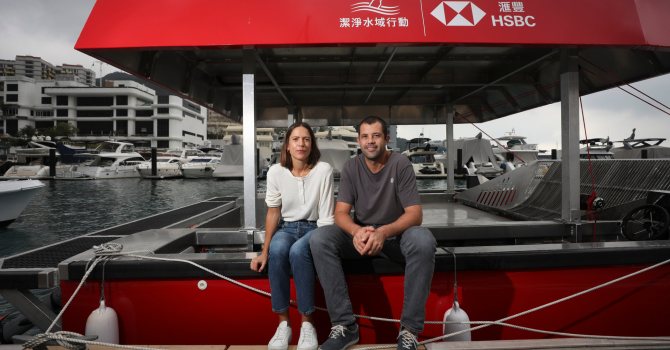As Asia embraces a zero-carbon future, Hong Kong must make a niche as a green finance hub
Something is in the air. China’s pledge in September to achieve carbon neutrality by 2060 spurred Japan and South Korea to make similar pledges to reduce net greenhouse gas emissions to zero by 2050. Hong Kong, too, committed to being carbon neutral by 2050. The European Union is already working within that time frame, and the next United States administration under Joe Biden is expected to make a similar pledge.
China has, in effect, ignited a quiet revolution in Asia. These pledges will transform government policies and regulations, change the way business is done and stimulate development of new standards and practices, so that we too will have to adapt to low-carbon lifestyles.
In case anyone is still in doubt, achieving environmental and social sustainability is the direction for the world’s socio-economic future, impacting everything we do, including finance, technology and education. To decarbonise energy, industry, transport and consumption within 30 to 40 years requires enormous amounts of capital to be directed away from high-carbon to low- and zero-carbon sources and businesses.
Moreover, decarbonisation has to take place alongside aggressive environmental protection – reviving degraded ecosystems, protecting biodiversity – all of which needs to be done in a way that is socially just.
In addition, investments in infrastructure and city management systems must adapt to severe weather events – storms, floods, landslides – caused by a changing climate.
Just think of the multiple trillions that will be needed not only for China to achieve carbon neutrality but also Japan and South Korea. Going forward, other Asian economies will also need capital for many green and sustainable projects, even if they are not yet ready to make explicit pledges of carbon neutrality.
There is no set playbook for such massive decarbonisation in such a short time frame. It needs to be an all-hands-on-deck approach for every economy, and represents significant opportunities for new businesses and jobs, especially for younger generations.
Obviously, the financial sector has a critical role in helping to raise funds to make this transition from brown to green.
Hong Kong’s capital markets are valued at HK$45.7 trillion, a footprint of great international significance. The city’s financial regulators have cottoned on to the change in the air. In May, the Green and Sustainable Finance Cross-Agency Steering Group was formed to come up with a coordinated strategy.
The group is co-chaired by the Hong Kong Monetary Authority, which regulates banking institutions, and the Securities and Futures Commission, which regulates stock and futures markets. Other members are the stock exchange, the Insurance Authority, and the Mandatory Provident Fund Schemes Authority, as well as the Environment Bureau and Financial Services and the Treasury Bureau.
On December 17, the steering group issued a strategic plan to help Hong Kong become Asia’s green finance hub through various means: essentially, to bring transparency to the risks in maintaining high-carbon business activities.
Why is this important? As governments set tighter low-carbon and greener policies, high-carbon and more polluting investments will become riskier to investors. As more and more investors look for zero- and low-carbon and environment-friendly investments, requirements that listed companies must disclose accurate, relevant information about their activities will help to show the relative corporate risks.
With such information being mandated in Europe, Hong Kong and also mainland China, a whole new industry in environmental, social and governance (ESG) disclosures is blossoming. ESG disclosures are meant to provide relevant information to facilitate risk management, capital allocation and investor protection.
Hong Kong’s professional services and education sectors must also play a role in meeting the demand for ESG disclosures, and one of the aims of the steering group’s plan is to help build capacity of the local financial services sector that will align with the work being done internationally.
Moreover, Hong Kong must carve out a decisive role in the collaboration between China and the EU to develop new financial reporting standards that take low carbon and sustainability into account. Rightly, the strategic plan takes this on board and Hong Kong is well-placed to participate.
The more competent and forward-looking Hong Kong is, the better it is positioned to help China and Asia raise funds, and also provide a plethora of service-related activities vital to its success as a finance hub. While this is a role Hong Kong has played for a long time, the difference now is that Hong Kong has to raise its game in understanding and leading the green transition.
The stock exchange has also staked out a claim to sustainability. It launched the Sustainable and Green Exchange this month, an online portal designed to give investors and asset managers access to information for due diligence, selection and monitoring of sustainable and green investments. The platform will connect issuers and investors to global green, social and sustainable products, innovative green financing solutions and opportunities.
There are many expectations for the Hong Kong government’s carbon neutrality plan, to be released in mid-2021, as it will provide the foundation for the financial regulators to continue their work.
The authorities must also find a way to collaborate closely with their mainland counterparts, which will require them to be highly innovative in enabling Hong Kong to launch green financial products, and to see how our markets and expertise in trading derivatives can be applied to carbon emissions, and in the longer term, perhaps a whole range of environmental products, such as electricity, water and sustainable forests.
Christine Loh, a former undersecretary for the environment, is an adjunct professor at Hong Kong University of Science and Technology
This article appeared on South China Morning Post online at https://www.scmp.com/comment/opinion/article/3115520/asia-embraces-zero-carbon-future-hong-kong-must-make-niche-green



